18 APRIL 2011
YOUR WORDS
Readers are invited to add their comments to any story. Click on the article to see and add.
BTN DISTRIBUTION
BTN also goes out by email every Sunday night at midnight (UK time). To view this edition click here.
The Business Travel News
PO Box 758
Edgware HA8 4QF
United Kingdom
info@btnews.co.uk
© 2022 Business Travel News Ltd.
Article from BTNews 18 APRIL 2011
ON TOUR: Egypt and the Jews – plus an update
Some thoughts of a travel writer by Malcolm Ginsberg
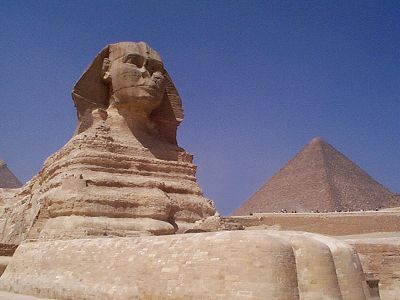 As it gets dark this evening (Monday 18 April) Jewish families all over the world will gather to celebrate Passover, the Exodus from Egypt.
As it gets dark this evening (Monday 18 April) Jewish families all over the world will gather to celebrate Passover, the Exodus from Egypt.
Traditionally the youngest participant in the service will ask the question “Why is this night different from all other nights?” with the response (amongst others) that matzah (unleavened bread) is eaten.
By convention for Christians it is also the night of the “Last Supper”, but this also depends on which version of the Bible you read.
Tomorrow is the first day of the week long Passover festival.
The events that are explained during the Passover evening happened in the land of the Pharaohs 3,500 years ago.
But in 2011 another question might be raised both from a current political and leisure point of view.
“Why is this year different from all other years?”
Let us clear up one myth. When the family of Joseph arrived from the land of Canaan the Great Pyramid of Giza had been around for over one thousand years. The Jews did not build it.
As far as the current governmental state of affairs is concerned we can do little, but viewing it holiday-wise, is Egypt a safe place to visit? For Joseph and his brothers it certainly was but times move on.
"Now there arose up a new king over Egypt, who knew not Joseph” (Genesis 46-8). And Moses was about to arrive onto the scene.
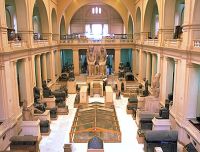 Joseph is thought to have settled in what at one time was called Rameses (after a Pharaoh), 75 miles north east of Cairo. It was close to the Nile and on the caravan route to Canaan. As a pseudo noble family they would have led a fine life with servants and accommodation in mud brick villas.
Joseph is thought to have settled in what at one time was called Rameses (after a Pharaoh), 75 miles north east of Cairo. It was close to the Nile and on the caravan route to Canaan. As a pseudo noble family they would have led a fine life with servants and accommodation in mud brick villas.
The story of Passover probably occurred 300 years later. “The Jews had multiplied” according to Exodus 1:8-10. What happen to the Hebrews in Egypt was a prelude to the history of the Jews throughout the generations. They were persecuted. What we don’t know is which cities in Egypt they built. Was the parting of the waves in the Red Sea a tsunami?
Moses, brought up as the nominal grandson of the Pharaoh also led a life of luxury during his formative years. His mother would have told him the stories of Joseph and his brothers.
We move on.
Jews have continuously dwelt in Egypt since well before the start of the Common Era. They existed in prosperous times, the great philosopher Maimonides finding his way from Spain, writing the “The Guide to the Perplexed” in 1176. Somehow the Jews survived some terrible pogroms. Traditionally they went where the commerce was and Egypt was at the cross roads of the known world.
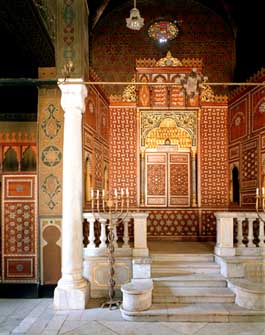 The Turks ruled the country for 400 years until thrown out by the British after the First World War. In 1922 it is estimated that there were 80,000 Jews in Cairo and Alexandria, the majority Sephardic but also Ashkenazi refugees from Eastern Europe. The rise of Nasser and the Suez campaign of 1956 signalled virtually the end of the community. A very small number linger on and whilst the fabric of a number of Synagogues in Cairo remain (and one in Alexandria) Judaism in Egypt is virtually extinct. However the Ben Ezra Synagogue in Old Cairo, with its cool marble floors, must be mentioned. Egypt’s relationship with Israel, and various visiting dignitaries, has ensured its upkeep. Lore has it that the Nile once flowed up behind the synagogue, and there, in the reeds, baby Moses was hidden.
The Turks ruled the country for 400 years until thrown out by the British after the First World War. In 1922 it is estimated that there were 80,000 Jews in Cairo and Alexandria, the majority Sephardic but also Ashkenazi refugees from Eastern Europe. The rise of Nasser and the Suez campaign of 1956 signalled virtually the end of the community. A very small number linger on and whilst the fabric of a number of Synagogues in Cairo remain (and one in Alexandria) Judaism in Egypt is virtually extinct. However the Ben Ezra Synagogue in Old Cairo, with its cool marble floors, must be mentioned. Egypt’s relationship with Israel, and various visiting dignitaries, has ensured its upkeep. Lore has it that the Nile once flowed up behind the synagogue, and there, in the reeds, baby Moses was hidden.
So where are we today?
Before the current revolution tourism represented 11% of Egypt’s domestic earnings and 15m tourists per year. Visitations revolved around six active areas with Cairo, Africa’s largest city, dominant. Most resorts are now recording very slow business.
During the peak winter season, 300 vessels typically jostled for space on the 125-mile stretch of the Nile between Luxor and Aswan. Now, the few ships back in service ply the river like apparitions, their deck chairs and hot tubs all but deserted. For the major British operators such as Tui (that is Thomson and First Choice) it is “business as usual”. There are terrific bargains to be had.
What will business be like this year?
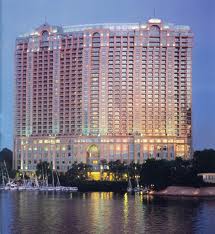 Nobody knows. Currently most resort areas are quiet but the new National Government is pumping a great deal of money into the sector and Egypt was recently very well represented at ITB Berlin, the world’s largest travel trade fair, complete with a massive sphinx. The British Government’s excellent travel advice pages (www.fco.gov.uk/en/travel-and-living-abroad) give the country an OK for visiting but with various recommendations. For British passport holders a visa is not necessary for the resort areas of Sharm El Sheikh, Dahab, Nuweiba and Taba.
Nobody knows. Currently most resort areas are quiet but the new National Government is pumping a great deal of money into the sector and Egypt was recently very well represented at ITB Berlin, the world’s largest travel trade fair, complete with a massive sphinx. The British Government’s excellent travel advice pages (www.fco.gov.uk/en/travel-and-living-abroad) give the country an OK for visiting but with various recommendations. For British passport holders a visa is not necessary for the resort areas of Sharm El Sheikh, Dahab, Nuweiba and Taba.
When it comes to the six different tourist super-sites each has its own flavour, and generally serves a different purpose. Surprisingly, or perhaps not, most of these tourist areas do not depend on ancient monuments to sustain them. In fact, only Luxor is completely dependent on this trade.
Alexandria and its immediacy might be slightly off limits. It could in fact be argued that this region extends to Marsa Matruh and the west coast towards Libya. The area has a Mediterranean feel about it, and the attraction is the Mediterranean Sea, and to the people of Cairo, a somewhat cooler climate. The cruise ships are now giving it a miss.
Cairo and Giza for the Great Pyramid. Cairo has everything. Great hotels, entertainment, restaurants, all manner of monuments from throughout the history of Egypt and it is often the entry point for most people visiting Egypt. It even has bowling alleys and several golf courses to chose from. The wonderful Egyptian Museum offers one of the world’s great collections from ancient times including the death mask of King Tutankhamen. Damage to the artefacts during the recent revolution was, thankfully, very limited.
From the UK the airline choice is good with bmi, British Airways and Egyptair on offer for the nearly five-hour flight. Most European capitals are served direct as is New York.
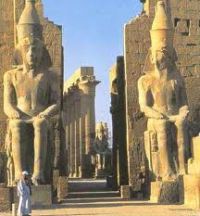 Luxor, over 300 miles south of Cairo – you must fly – is a living museum with vast numbers of ancient Egyptian monuments. It is also highly orientated to tourists, and might be thought of in the same regard as a theme park, where the attractions just happen to be actual monuments. The Valley of the Kings is the real thing and truly awesome.
Luxor, over 300 miles south of Cairo – you must fly – is a living museum with vast numbers of ancient Egyptian monuments. It is also highly orientated to tourists, and might be thought of in the same regard as a theme park, where the attractions just happen to be actual monuments. The Valley of the Kings is the real thing and truly awesome.
Aswan, even further south, is probably the least of the super-site tourist areas, but has great hotels, along with the huge artificial Lake Nasser. Berenice is the local Red Sea resort. The coast is lined with mangrove swamps and unspoiled bays and coves. While Berenice is famous for fishing, it also has some of Egypt's best health spas.
Hurghada and the surrounding area on the west coast of the Red Sea have led Egypt’s rise as a tourist destination. Not too far away are El Gouna and Safaga, and these contain just about everything a holidaymaker would like to have, with the exception of ancient monuments. They make up for that with every variety of water sports, several golf courses, casinos and more. The Red Sea area has less of an Egyptian feel, but not as European as the Sinai opposite across the water. It is nearly six hours on easyJet from Gatwick North and quality charter flights are operated by Thomas Cook Airlines amongst others.
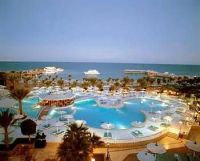 Sharm El Sheikh, and the surrounding area including Sharks Bay, now includes the residence of deposed President Hosni Mubarak. Do not be put off by his presence behind very secure walls under what is technically house arrest. This is the Sinai super-site water side, again with virtually everything any tourist might wish. It is on the BA schedule from Gatwick, with easyJet operating from that airport too and also Luton. Once again there are charter flights by various tour operators.
Sharm El Sheikh, and the surrounding area including Sharks Bay, now includes the residence of deposed President Hosni Mubarak. Do not be put off by his presence behind very secure walls under what is technically house arrest. This is the Sinai super-site water side, again with virtually everything any tourist might wish. It is on the BA schedule from Gatwick, with easyJet operating from that airport too and also Luton. Once again there are charter flights by various tour operators.
The situation regarding holidaymaking in Egypt is fluid. Memories are short. In 1997 60 tourists were shot at the mortuary temple of Queen Hatshepsut in Luxor. This was quickly forgotten and the travellers returned.
The answer is probably not to book too far in advance and take the opportunity offered with very much discounted prices. You might find the resort quiet, and that might also be what you wanted. The tourist destinations seem OK . However in much of the rest of the mainland interior, travel and destinations are limited. Follow the advice of the British Foreign Office.
www.touregypt.net/edestinations.htm
OUR READERS' FINEST WORDS (All times and dates are GMT)
All comments are filtered to exclude any excesses but the Editor does not have to agree with what is being said. 100 words maximum
